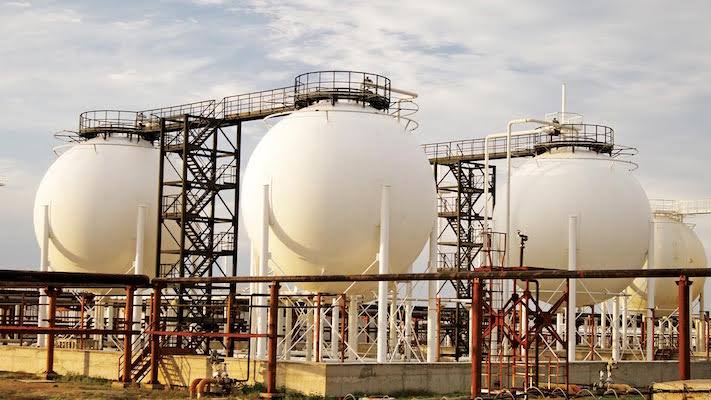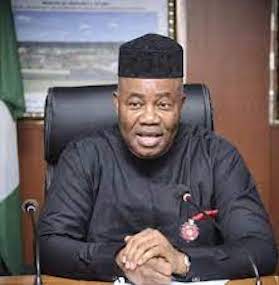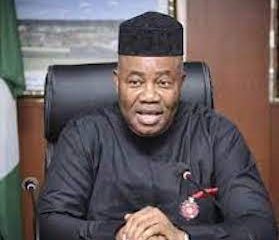NEWS
Nigeria requires $20bn annually for gas expansion projects – NEITI

The Nigeria Extractive Industries Transparency Initiative (NEITI) says Nigeria requires $20 billion annually to achieve the desired gas expansion plan to bridge the country’s gas infrastructure.
Dr Orji Ogbonnaya Orji, NEITI Executive Secretary, at the policy dialogue on Nigeria’s Decade of Gas Action plan on Monday in Abuja said given the shrinking fossil fuel investment landscape, clarity was required of infrastructure to be prioritised.
The dialogue was organised by the African Initiative for Transparency, Accountability and Responsible Leadership (AFRITAL) in collaboration with the Natural Resource Governance Institute (NRGI).
The Federal Government in December 2020 rolled out the National Gas Expansion Programme (NGEP) to deepen the use of natural gas and make it a preferred form of cleaner, cheaper energy for both personal and industrial use.
In a remark, Orji said Nigeria had the largest gas reserves in Africa and the ninth-largest globally with gas reserves of over 200 trillion cubic feet (tcf).
“The Petroleum Industry Act (PIA) provides the most significant progress for the gas sector in strengthening governance and providing fiscal frameworks for the sector’s growth.
“The gas utilisation plan should show the market-driven opportunities that would successfully translate the gas plans into sustainable economic development.
“For the gas utilisation policy to work, there is a compelling need for deliberate ambitious investment in its infrastructure. This includes specific connectivity across upstream facilities to processing, power plants and other end uses.
“The network code provides a framework through third-party access to resolve some of the connectivity issues but to a large extent, achieving the desired gas expansion will require an estimated $20 billion annually,” he said.
Orji said that a new concept analysis would be required to demonstrate the new approaches the government intends to embrace to deliver on the gas infrastructure.
He recommended that the Federal Government should develop and publish a detailed, realistic, coated and comprehensive gas policy with clear roles for the state, and non-state actors and timelines to track periodic progress.
Orji urged government to develop an industry-specific linkage between the integrated gas policy with Nigeria’s energy transition policies with a supporting action plan built on a robust monitoring and evaluation framework to track implementation.
He also called for a detailed plan to end gas flaring through a private sector-led commercialisation programme and pursue an open, competitive and transparent gas flare commercialisation programme,” he said.
Earlier, Dr Louis Ogbeifun, the Executive Director AFRITAL, had decried the fact that Nigeria is so rich in gas, but most of its citizens use firewood or coal for cooking with all its attendant health hazards.
“Over the years, Nigeria has behaved like the prodigal son by exporting mineral resources to earn dollars for consumption without savings, reinvestment in revenue, and employment generation ventures.
“These analogies reflect the contradiction of being a rich but poor nation. Rich because Nigeria is vastly rich and blessed with abundant minerals and energy resources but so poor that most citizens lack access to affordable electricity and other essential social and welfare benefits,” Ogbeifun said.
He said in a bid to reverse the highlighted negative narrations, achieve energy accessibility, afordability, and sustainability as a country that the 2021-2030 government legislation tagged the “Decade of Gas Action Plan (DofG)” was enunciated.
According to him, If the government’s intentions are effectively implemented, Nigeria is expected to witness a vast gas Infrastructural development during the period.
He said part of the stepping stones toward achieving the goals of DofG was the construction of the 614km Ajaokuta-Kaduna-Kano gas pipeline to transport about two billion cf of natural gas per day.
“This and other initiatives are also aimed at deepening the usage of LPG and CNG in the country and ultimately expanding the Autogas policy, which would reduce dependency on petrol as our mainstay for transportation in the long run.
“Before the AKKP project, Nigeria conceptualised the Nigeria-Morroco Gas Pipeline, as an extension of the West Africn Gas Pipeline, which would run through some African countries with a possible linkage to European market.
“This project was conceptualised in 2016. Outside the NLNG project, the Nigeria-Morrocco Gas Pipeline project would meet the international focus even as the local expansion of the LPG and CNG are also being pursued.
“Let us hope that our leaders would cautiously navigate the rough edges of the coup in the Niger Republic to forestall the risks of sabotage of this project by international state and non-state actors,” he said.
Also speaking, Mr Aaron Sayne of NGRI, called for tackling of foreign exchange and policy issues, investment and access to finance on gas project while indigenous players should take place of the International Oil Companies.
Mrs Oluremi Komolafe, Director, Gas, Ministry of Petroleum Resource, said the ministry would remain was committed to energy transition.
Komolafe added that the NGEP was making way toward its realisation, while Compressed Natural Gas engines conversion was ongoing, noting that production would be spured to meet demand.
NEWS
Troops Neutralise Notorious Terrorist Auta, others in Zamfara

Troops of Mobile Strike Team, under Operation Fasan Yamma (OPFY), say they have killed scores of terrorists in a decisive operation around Ƙunchin Kalgo in Tsafe Local Government of Zamfara.The Director, Defence Media Operations, Maj.-Gen. Markus Kangye, made this known on Thursday in Abuja.
Kangye said that a notorious terrorist, known as Auta, alongside his associates Abdul Jamilu and one Salisu, were among those killed in the encounter. According to him, these terrorists were linked to multiple acts of violence and terrorism within the general area.“The operation marks a significant blow to criminal elements, destabilizing peace and security in the area.“Preliminary intelligence indicates that two additional terrorist kingpins, including one identified as Babayé were eliminated during the operation.“In a separate incident, Sale Ado Madele (alias Sarki), the eldest son of known bandit leader Ado Alieru, was also reportedly killed,” he said.Kangye said the troops had in another encounter, killed additional 10 terrorists who congregated near a filling station in Danjibga.He said the terrorist were believed to be part of a syndicate brought together by Dogo Sule for a planned attack.“The Nigerian Armed Forces remain committed to safeguarding lives and restoring lasting peace across Zamfara and the wider North-West region.“This operation underscores our resolve to dismantle terrorist networks and bring perpetrators of violence to justice,” he said. (NAN)NEWS
10th Senate Passed 96 Bills, Adopted 18 Petitions-Akpabio

The President of the Senate, Godswill Akpabio, says the 10th Senate has passed 96 bills out a total of 844 bills introduced within its first two years.He said that the Senate also adopted 18 petitions out of the 80 received.Akpabio made this known on Thursday during a joint session of the National Assembly to celebrate 2025 Democracy Day.
He said that the 10th National Assembly had played its part with diligence and distinction. “From its inception, the 10th Senate demonstrated a renewed vigour for addressing the country’s complex challenges through purposeful legislation.“This commitment is reflected in its extraordinary output: a total of 844 bills have been introduced within its first two years—an unprecedented figure.“This figure underscores the Senate’s proactive posture in tackling pressing national issues.“Out of this impressive volume, 107 bills are currently at the committee stage, undergoing the necessary scrutiny and stakeholder engagement that ensures quality legislation.“Two hundred and six bills are awaiting first reading, reflecting a robust pipeline of legislative ideas prepared for formal introduction and 409 bills have advanced to second reading.“Notably, the Senate has passed 96 bills, a record for any Nigerian Senate at this stage of the legislative cycle.“Even more significantly, 52 of these bills have been assented to by the President, translating into enforceable laws that will shape governance, economic development, public welfare, and national security.“These bills include the National Education Fund, Local Government Autonomy Bill, Regional Development Commission, Tax Reform, University and Tertiary Institutions, Agricultural Institutions bills etc.”Akpabio said that the upper chamber had acted decisively on 26 Executive bills, showcasing a healthy balance of cooperation and oversight in its engagement with the executive arm.“These executive-sponsored legislations address key policy areas and benefit from the Senate’s thorough review and refinement before passage.”The senate president said that beyond bills, the 10th Senate had received a total of 80 petitions from citizens and civil society.“This is a testimony to public trust in the institution. Of these, 18 petitions have been fully adopted, providing redress, transparency and institutional accountability,” he said. (NAN)NEWS
JUNE 12: Good Governance is the Cornerstone of Democracy – CAN

By Laide Akinboade, Abuja
President, Christian Association of Nigeria (CAN), Archbishop Daniel Okoh on Thursday, facilitate with all Nigerians as they commemorate June 12, a day that symbolizes the collective commitment to democracy, freedom, and justice. He added that the legacy of the 1993 elections remains a beacon of hope and a reminder of the nation’s enduring democratic spirit.
This was contained in a statement issued by CAN, signed the CAN President, in Abuja. .The Archbishop lamented the rate of kidnappings and killings by bandits urged the Federal government take an urgent and sustained action to safeguard lives and property across the country.The statement reads in oarts, “As we reflect on this journey, we urge all Nigerians to embrace unity, peace, and mutual respect. We must stand firm against religious intolerance and violence in all forms. The government has a sacred duty to protect religious freedoms, ensure that no one is persecuted for their faith, and deliver justice to victims of religious violence.”Insecurity, including insurgency, banditry, and kidnapping, continues to threaten our nation’s stability. We call for urgent and sustained action to safeguard lives and property across the country. CAN remains committed to supporting every initiative aimed at restoring lasting peace and security.”Good governance is the cornerstone of any democracy. We call for greater transparency and accountability at all levels of government. Nigeria’s vast resources must be harnessed to address poverty, unemployment, and inequality, and to improve infrastructure, healthcare, and education. Free, fair, and credible elections are vital to sustaining democratic integrity.”We urge the Independent National Electoral Commission (INEC) to strengthen its systems and processes to enhance electoral transparency and public trust. In a true democracy, the rights to free speech, peaceful assembly, and press freedom must be upheld. We encourage the government to engage citizens constructively and seek inclusive solutions to national challenges.”As we mark this significant day, CAN prays for the peace, unity, and progress of our beloved country. We call on all Nigerians to remain committed to building a just, inclusive, and prosperous nation; one that honors the sacrifices of our democratic heroes.”We also appreciate the efforts of the government, security agencies, and citizens who continue to uphold the values of democracy and national cohesion.”God bless the Federal Republic of Nigeria”, he said.













